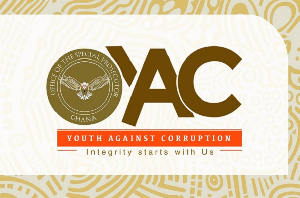 The Youth Against Corruption Streetwise Series is a civic engagement initiative under the OSP
The Youth Against Corruption Streetwise Series is a civic engagement initiative under the OSP
Anti-corruption advocates have expressed dissent against the GH¢20,000 threshold in the recently launched code of conduct for political appointees, arguing that it undermines the country’s anti-corruption efforts.
The concerns were raised during the Youth Against Corruption Streetwise Series, a civic engagement initiative under the Office of the Special Prosecutor.
Themed “Code of Conduct for Political Appointees: Why Should the Youth Care?”, participants challenged the justification for setting the gift ceiling at such a high level, particularly in contrast to the 2013 Code under the first term of President John Mahama, which pegged the limit at just GH¢200.
Manasseh Azuri Awuni, investigative journalist, noted that the policy shift contradicts the public’s expectations and the financial realities of many Ghanaians.
“A GH¢20,000 gift is roughly equivalent to a minister’s monthly salary. What is the difference between that and an inducement? The threshold completely defeats the purpose of the code,” he added.
He further noted that while the code is a step in the right direction, the provisions on the gift limit could open the door to unethical influence and conflicts of interest.
Daniel Korley Botchway, President and CEO of the National Union of Ghana Students (NUGS), questioned the absence of an aggregation clause in the policy, which could allow individuals or businesses to make multiple “legitimate” donations under the threshold to the same official.
“If there’s no cap on how often you can receive GH¢20,000 from the same person, then this becomes a licence to collect GH¢100,000 a month, and nobody can question it,” he argued.
Advocating for a total ban on gift-taking, Sulemana Zakaria, a Youth Against Corruption Champion, noted that the code of conduct in its current form, without clear and enforceable sanctions, risks becoming just another document with no bite.
Vera Addo, Programmes Officer at CDD-Ghana, delved into the broader cultural and systemic issues that drive unethical giving.
She cited societal expectations on public officials to attend funerals, donate to churches, and support constituents financially as pressures that normalise gift-giving in ways that blur the lines between generosity and patronage.
She said, “People expect appointees to have money. We invite them everywhere with the hope that they’ll give something. So, it’s not always about influence—it’s also the political culture and financing we need to interrogate.”
Touching on weak enforcement of existing anti-corruption laws, including the underutilisation of the Right to Information (RTI) Act and the low rate of compliance with asset declaration requirements, Ms Addo said, “It’s not just about passing laws; enforcement is key. Citizens need to trust the process. But many don’t believe their complaints will lead anywhere.”
Joining the call for stronger reforms, Manasseh Azuri acknowledged the scepticism surrounding independent accountability institutions, citing past failures.
He, however, highlighted recent developments such as the suspension of a controversial $90 million payment in the SML case as proof that even flawed oversight systems can produce tangible results.
He added that although the code will contribute to investigative journalism practice in Ghana, the media, civil society, and citizens should continue pushing, engaging, and staying vigilant.
The Youth Against Corruption Streetwise Series is a space for Ghana’s youth to shape the national anti-corruption conversation, placing integrity, transparency, and civic responsibility at the heart of the country’s political future.
BAI/MA
